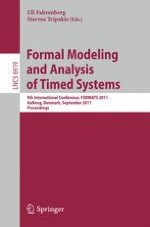2011 | Buch
Formal Modeling and Analysis of Timed Systems
9th International Conference, FORMATS 2011, Aalborg, Denmark, September 21-23, 2011. Proceedings
herausgegeben von: Uli Fahrenberg, Stavros Tripakis
Verlag: Springer Berlin Heidelberg
Buchreihe : Lecture Notes in Computer Science
